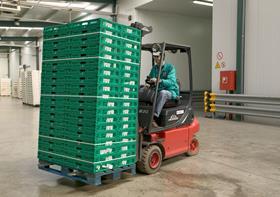
Fresh King, a leading grower and shipper of tropical and exotic fruits and vegetables in the US, has announced in a press release plans to expand shipments on CHEP pallets in the near future.
Fresh King continues to experience customer service improvements from the use of the CHEP pallet pooling system, which it now uses to transport avocados, coconuts, miniature vegetables, limes, lychees, mangoes, yellow tomatoes, carambola, sugar-snap peas, snow peas and French green beans from its warehouse just south of Miami to supermarkets, warehouse clubs and other wholesale distributors in the north-east, Texas and the Pacific Coast.
Fresh King said it has been growing its use of the CHEP pallet pooling programme for more than a decade, previously using limited-use pallets which lacked from a performance standpoint.
“With CHEP, we get a dependable pallet that our customers prefer,” explained Angel Jaimes, warehouse manager at Fresh King. “There are rarely any rejections of our loads at the customer’s receiving docks and that keeps our costs down.”
Mr Jaimes said sustainability had been elevated in importance at Fresh King during the past year, adding that the CHEP programme has had positive synergies with other packaging projects such as the use of a new box made from 100 per cent recycled paper that Fresh Kind was now using for most commodities.
Based on third-party Life-Cycle Inventory Analysis findings, through its use of the CHEP pooling system as opposed to limited-use whitewood pallets, Fresh King said it is reducing solid waste generation associated with shipping platforms by 95 per cent, decreasing greenhouse gas emissions by 58 per cent and saving enough energy to power two homes with electricity for a year.
“Fresh King is proof that you don’t need to be a large company to experience the benefits of the CHEP programme. It is a great example of how mid-sized companies can improve customer service and reliability while reducing capital expenditures,” added Tim Smith, vice-president of new business development at CHEP USA.






No comments yet